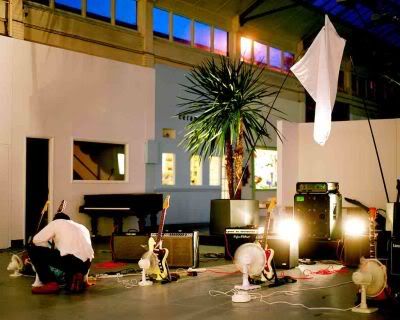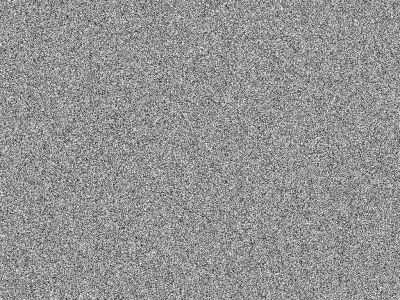Send / Recieve
Some years ago, when I was working at The Fishmarket Gallery in Northampton, I was lucky enough to meet the Glasgow based musician and artist Fergus Lawrie. Fergus used to be in the band Urusei Yatsura but now makes experimental sound pieces and installations under various guises and among a rich scene of other experimental practitioners in Scotland.
Obscure Desire of the Bourgeoisie installed at the Fishmarket Gallery, 2009. Photo by Phil Sharp.
When we met back in 2009 Fergus staged a project titled The Obscure Desire of the Bourgeoisie, a beautifully atmospheric work that involved the manipulation of gently fuzzing electric guitars by the undulation of electric fans. The swell of the noise, which seemed to make the breeze audible, sounded magnificent in the cavernous ex-market building. We had several sound works and performances in the gallery over the years and it really seemed like the best possible thing to fill that space with. The building seemed to come to life - it soaked up, flipped back and rang warmly with all kinds of sound from un-amplified voices to drone violin to recorded symphonies to raucous, wrangling guitar.
On that night Fergus came, at the invitation of our exhibiting artist Louise Marchal, with a group of fellow experimental musicians including Lee Cummings (aka Kylie Minoise) and Neil A Simpson (aka Buffalo buffalo buffalo Buffalo buffalo) who are among those behind a new film he has made alongside Ben Ewart-Dean.
Send/Receive (Part 1) from Ben Ewart-Dean on Vimeo.
Send / Receive talks to some of the key players in the Glasgow experimental scene and asks them, among other things, to name their favourite sounds. All the answers are strange, brilliant and sincerely meant - from sirens; laughter; the sub-bass from a bus engine and a speeding motorway through a dictaphone right down to silence and the simplicity of the human breath.
The interviews are interspersed with blunt bursts of visual white noise - the screaming storm of white pixels familiarly associated with fuzz, drone and the presence of 'no signal'. Out of this crunchy haze we hear passages of music by some of the interviewed artists; some angrily match with the manic white-out of the visuals while others are slight and sparse bricolages of faintly familiar sounds. Presenting the music in this way made me think of the idea of Acousmatics - the notion of purposely veiling the material source of a sound so as to better experience its integral and autonomous nuances. To hear and feel the sound as an independent object as opposed to simply an effect.
Send/Receive (Part 2) from Ben Ewart-Dean on Vimeo.
This type of sonic experience is referenced in the film and it seems, in some ways, to be at the root of this experimental work. There is a sense that all noise takes up its place within a broad, open space of musicality - there is an urge to plunder and re-compose the world of noise that is democratic and non-specific in the best possible sense. Sirens can be beautiful, the noise of a train is textured, layered and has a pulse. There is even the admission that pre-existing sound, or ready-made sound if you like, is often better than anything that could be consciously composed.
In the film Raydale Dower references the idea of 'framing' in relation to this and acknowledges the importance of context to be able to hear such noise anew. Perhaps this de-contextualising or framing is also a kind of veiling. The action of transposing sound from the specificities of the world it inhabits to a more intimate context where it is possible to really hear what is going on.
While I think there is an acousmatic comparison to be drawn here, I also like the fact that these musicians are tuned in to not just the audio but to the material make up of the world around them. The experience of hearing certain sounds - where you were, the time of day, the specific location, the touch and feel of an object in your hands - all of these tangible things seem to become constitutive to the end result of their music




Comments